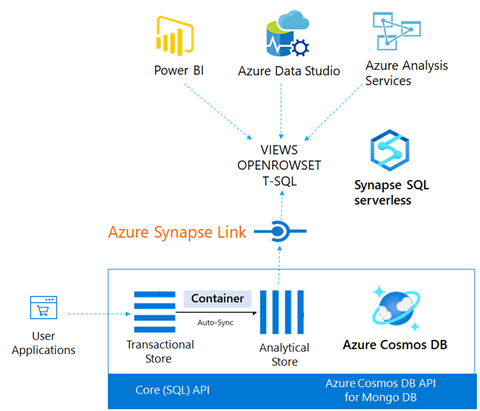Today, at Microsoft Ignite 2020, we announced new ways to run serverless workloads and bring the power of Azure Synapse Analytics to operational data in Azure Cosmos DB. These capabilities offer new possibilities for NoSQL developers and data analysts to power applications at any size or scale – from dev/test to production. You can explore these new features and more in these sessions:
- On-Demand: Building modern apps with Azure Cosmos DB serverless and Azure Cache for Redis enterprise
- On-Demand: Real-time analytics and BI using Azure Synapse Link for Azure Cosmos DB
- On-Demand: Best practices of running cloud native applications on Azure
Azure Cosmos DB serverless for all APIs
We recently launched the preview of Azure Cosmos DB serverless for the Core (SQL) API. It was a huge milestone for us, and made Azure Cosmos DB even easier to get started with or to run small applications. Today we announced that serverless will soon be available for all Azure Cosmos DB APIs – Core, MongoDB, Cassandra, Gremlin and Table.
 Azure Portal cost detail of serverless database operation
Azure Portal cost detail of serverless database operation
Serverless offers a cost-effective way to run small, spiky workloads and radically changes the way you use and pay for Azure Cosmos DB NoSQL database resources. With this consumption-based model, you are charged for the Request Units (RU) used by your requests and the storage consumed by your data. This means that there’s no minimum cost when using serverless – you only pay for what you use.
To get started with Azure Cosmos DB serverless, head to aka.ms/cosmos-serverless.
We want to hear about your serverless experience. Please share your feedback at azurecosmosdbserverless@service.microsoft.com.
T-SQL queries and real-time BI dashboards with Azure Synapse Link
Starting next month, you’ll be able to use Synapse SQL serverless to run queries over data in Azure Cosmos DB and build powerful real-time business intelligence dashboards. This extends the capabilities of Azure Synapse Link, enabling data analysts to gain real-time insight into the data stored in Azure Cosmos DB and query using their choice of T-SQL or Spark. There has been great interest in this feature since we began a gated preview in May, and we’ve incorporated a lot of customer feedback into this public preview.
This support allows you to use familiar T-SQL syntax to explore data in Azure Cosmos DB in place, within seconds, and without the need for ETL to move or duplicate data into a specialized store. Using the SQL serverless runtime in Azure Synapse Link, you can create SQL views and connect these views to PowerBI in DirectQuery mode. You can also connect to a wide range of BI reporting and ad-hoc querying tools using the well-supported T-SQL interface.
Another very cool capability that’s now unlocked is the ability to build a logical data warehouse to create and analyze unified views of data across Azure Cosmos DB, Azure Data Lake Storage and Azure Blob Storage. You can learn more by reading about querying Azure Cosmos DB analytical store with Synapse SQL serverless, or by completing a tutorial on building rich BI dashboards.
For any feedback or suggestions, please reach out to us directly at cosmosdbsynapselink@microsoft.com.
Support for Azure Cosmos DB API for Mongo DB in Azure Synapse Link
We’re also announcing support for Azure Cosmos DB API for MongoDB in Azure Synapse Link, and expansion of the public preview that started with support for the Core (SQL) API. This brings cloud native HTAP capabilities to MongoDB data, using the Azure Cosmos DB API for MongoDB.
Today, you can run Spark queries against the data in MongoDB collections, with no impact to OLTP workloads and no ETL. Beginning next month, you’ll also be able to use Synapse SQL serverless to run T-SQL queries and to build real-time BI dashboards using Power BI in Direct Query mode over this data.

We’ve made an additional investment in how we manage the schema of the Azure Cosmos DB analytical store during the fully managed auto-sync functionality of Azure Synapse Link – called full-fidelity schema representation. This provides schema disambiguation out-of-the-box in the analytical store in scenarios where your operational data has highly polymorphic NoSQL schemas and schema drift. This full fidelity schema representation is the default experience when Azure Synapse Link is enabled in Azure Cosmos DB API for MongoDB. To learn more, check out our documentation on automatic handling of schema updates in the Azure Cosmos DB analytical store.
To get started, check out our guide on how-to configure Azure Synapse Link and visit our FAQ page for answers to commonly asked questions. You can also check out samples to get started on Github.
For any feedback or suggestions, please reach out to us directly at cosmosdbsynapselink@microsoft.com.
Get Started
- Discover the capabilities and benefits of Azure Cosmos DB
- Learn about Azure Cosmos DB serverless
- Learn about Azure Synapse Link

0 comments